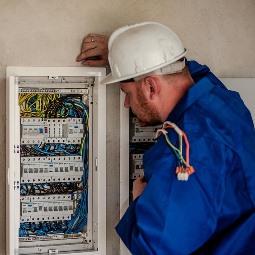How to Pick the Best Trade School near Hull Iowa
 Deciding to begin a new occupation and enroll in a trade school near Hull IA are important decisions that will profoundly influence your long term career. However with so many vocational schools to pick from, exactly how do you approach locating the right one? Not only do you have to confirm that you will obtain the extensive training needed to be successful in your new profession, but also that the school is highly regarded and reputable. Many students make the mistake of choosing a trade school simply because the campus is nearest to their residence or where the work. Others might gravitate to the school that charges the lowest tuition. Of course the location and cost of the training are critical factors when analyzing trade school options, but they should not be the sole ones. Other considerations such as accreditation and the reputation of the schools are critical as well. So prior to beginning your evaluations and comparing trade schools, you must know what questions you should be asking so you can get the information to make a final selection. We will address several of those questions shortly in this article. But to start with, let’s talk about a few of the vocation options that are offered including the accessibility of online schools.
Deciding to begin a new occupation and enroll in a trade school near Hull IA are important decisions that will profoundly influence your long term career. However with so many vocational schools to pick from, exactly how do you approach locating the right one? Not only do you have to confirm that you will obtain the extensive training needed to be successful in your new profession, but also that the school is highly regarded and reputable. Many students make the mistake of choosing a trade school simply because the campus is nearest to their residence or where the work. Others might gravitate to the school that charges the lowest tuition. Of course the location and cost of the training are critical factors when analyzing trade school options, but they should not be the sole ones. Other considerations such as accreditation and the reputation of the schools are critical as well. So prior to beginning your evaluations and comparing trade schools, you must know what questions you should be asking so you can get the information to make a final selection. We will address several of those questions shortly in this article. But to start with, let’s talk about a few of the vocation options that are offered including the accessibility of online schools.
Vocational School Program Options near Hull IA
 There are a number of trades to pick from in vocational schools that provide fulfilling and high paying careers. Maybe you have already selected one that you have for years desired to pursue. For instance, perhaps you have always taken pleasure in working on your car and have considered utilizing that ability to earn a living as a car mechanic. Or maybe a family member has had a prosperous career in a particular vocation or trade and you would love to follow in her or his footsteps. Whatever your inspiration is for going into a trade, there is likely a program available that will give you the training that you require. Below is just a modest representation of the trade school programs that are offered in the Hull IA area.
There are a number of trades to pick from in vocational schools that provide fulfilling and high paying careers. Maybe you have already selected one that you have for years desired to pursue. For instance, perhaps you have always taken pleasure in working on your car and have considered utilizing that ability to earn a living as a car mechanic. Or maybe a family member has had a prosperous career in a particular vocation or trade and you would love to follow in her or his footsteps. Whatever your inspiration is for going into a trade, there is likely a program available that will give you the training that you require. Below is just a modest representation of the trade school programs that are offered in the Hull IA area.
- Automotive Technician
- Heating and Cooling (HVAC) Tech
- Plumber
- Electrician
- Welder
- Truck Driver
- Aircraft Maintenance Tech
- Lab Technician
- Construction Management
Each of the programs will have differing completion times and costs based upon the vocation, credential earned and school. Some of the programs may be completed in a few weeks, while others will call for several months or even 2 or more years of training. All of these variables need to be considered prior to choosing a trade and a school.
Click Here to Get Free Information on Trade Schools Near You!
Learning a Trade Online
 Schools available online have become very popular with Hull IA students and increasingly more accredited programs are becoming available. Although online learning is a readily available and practical way to acquire a certificate or degree, it might not be the best option for all trades or vocations. For instance, training to drive a tractor trailer is not something that you can accomplish online, nor is training how to weld. These are skills that need to be acquired through practical training and by doing it, not by studying or watching videos. But certain components of the training can be suitable for online education, for instance studying safety and driving regulations for trucking schools or studying metallurgy or how to read blueprints for welding schools. Many programs will incorporate online education with on campus practical training, for example for HVAC or plumbing schools. So it is essential to find out before enrolling in an online program for any trade if there is an adequate amount of hands-on training allocated to the course of study. One way to help establish est that a vocational school program is both appropriate for online education and delivers comprehensive hands-on training is to confirm that it’s accredited by a nationally acknowledged accrediting organization (more on accreditation later). For those vocations that are suitable for training online, it can be a practical way for students with limited time to acquire a new vocation.
Schools available online have become very popular with Hull IA students and increasingly more accredited programs are becoming available. Although online learning is a readily available and practical way to acquire a certificate or degree, it might not be the best option for all trades or vocations. For instance, training to drive a tractor trailer is not something that you can accomplish online, nor is training how to weld. These are skills that need to be acquired through practical training and by doing it, not by studying or watching videos. But certain components of the training can be suitable for online education, for instance studying safety and driving regulations for trucking schools or studying metallurgy or how to read blueprints for welding schools. Many programs will incorporate online education with on campus practical training, for example for HVAC or plumbing schools. So it is essential to find out before enrolling in an online program for any trade if there is an adequate amount of hands-on training allocated to the course of study. One way to help establish est that a vocational school program is both appropriate for online education and delivers comprehensive hands-on training is to confirm that it’s accredited by a nationally acknowledged accrediting organization (more on accreditation later). For those vocations that are suitable for training online, it can be a practical way for students with limited time to acquire a new vocation.
What to Ask Vocational Schools
 Once you have selected the vocation and type of degree or certificate that you wish to earn, either online or on campus, you can begin to limit your list of schools. As you are certainly aware, there are a large number of technical schools in the Hull IA area and across the Country to select from. That’s why it is very important to have a list of relevant qualifiers when making school assessments. As earlier stated in our opening paragraph, location and tuition will most likely be the initial two factors you will take into consideration. Following are some additional ones that you will want to research before enrolling in your school of choice.
Once you have selected the vocation and type of degree or certificate that you wish to earn, either online or on campus, you can begin to limit your list of schools. As you are certainly aware, there are a large number of technical schools in the Hull IA area and across the Country to select from. That’s why it is very important to have a list of relevant qualifiers when making school assessments. As earlier stated in our opening paragraph, location and tuition will most likely be the initial two factors you will take into consideration. Following are some additional ones that you will want to research before enrolling in your school of choice.
Accredited. Numerous Hull IA area trade schools have acquired either a regional or a national accreditation. They may receive Institutional Accreditation, which involves the school’s programs overall, or Programmatic Accreditation, which relates to an individual program, for example HVAC technology. Verify that the school is accredited by a U.S. Department of Education acknowledged accrediting agency, for instance the Accreditation Board for Engineering and Technology. In addition to helping make certain that you get a superior education, it may assist in acquiring financial aid or student loans, which are in many cases not available for non-accredited schools. Furthermore, a number of states mandate that the training course be accredited for it to qualify for licensing where applicable.
How Long in Business? One indicator to help evaluate the quality of a trade school near Hull IA is how long it has been in operation. A negatively reviewed or a fly by night school usually will not be in business very long, so longevity is a big plus. On the other hand, even the best of schools had to start from their first day of training, so use it as one of several qualifiers.
Completion Rates. Ask the vocational schools you are reviewing what their completion rates are. The completion rate is the percentage or portion of students who enroll in and finish the program. A lower completion rate could signify that students were dissatisfied with the course and quit. It could also signify that the teachers were not competent to instruct the students. It’s similarly essential that the schools have high job placement rates. Older and/or more reputable schools may have a more extensive directory of graduates, which can result in more contacts for the school to utilize for their apprenticeship and job placement programs. A high job placement rate can not only confirm that the school has a good reputation within the trade, but additionally that it has the network of contacts to help graduates secure apprenticeships or jobs in the Hull IA area.
Apprenticeship Programs. Many vocational programs are taught together with an internship or an apprenticeship program. Those participating trade and vocational schools will help place you in an apprenticeship program inside their network of businesses or trade unions. Check if the schools you are considering have referring relationships with Hull IA area specialists in the trade. An apprenticeship not only offers a valuable experience by furnishing hands-on training, but it also supplies employment opportunities and helps to form relationships in the area professional community.
Modern Facilities. Make certain that the campus facilities and the equipment that you will be trained on are state-of-the-art and what you will be working with in the field. If you are already in an internship or an apprenticeship, consult with the specialist you are working with concerning what you should be looking for. If not, ask a local Hull IA contractor if they can provide some tips. Also bear in mind that unless you are willing to move, the school needs to be within driving distance of your home. Take note that if you decide to attend an out-of-state school, besides the added moving costs there may be higher tuition charges compared to in-state residents.
Smaller Classes. It’s desirable that you receive as much individualized training as possible, which can be challenging in bigger classes. Ask if you can monitor a couple of the classes so that you can see how large they are and witness first hand the interaction between students and instructors. Speak with some of the students and get their feedback relating to class sizes and instruction. Finally, talk with some of the instructors and find out what their level of experience is in Iowa and what certifications or degrees they have earned.
Flexible Scheduling. Verify that the class schedules for the schools you are evaluating are flexible enough to fulfill your needs. If you are only able to go to classes in the evening or on weekends near Hull IA, confirm that the programs you are looking at provide those options. If you can only attend part-time, make certain that the school you select permits part-time enrollment. Additionally, ask what the protocol is to make-up classes should you miss any due to work, illness or family emergencies.
Vocational Tech School Hull Iowa
 Picking the ideal trade school near Hull IA is an important beginning toward a gratifying career in the vocation of your choice. As we have covered in this article, you should select a vocational school and a certificate or degree program that are both accredited and have outstanding reputations within the field. Other things to look for are lots of hands-on training and state-of-the-art facilities. You should check out each of the schools personally that you are most interested in to inspect the campus and speak with both the current students and faculty. Try to get a feel for the quality of the teaching and the interaction between them. Additionally, ask about scheduling options and whether night or weekend classes are available if needed. And remember to inquire about financial aid and student loan options too. You initially came to this website because of your interest in Vocational Tech School and wanting more information on the topic Local Auto Mechanic Trade Schools. However, if you ask the appropriate questions as we have detailed in our guidelines for evaluating schools, you’ll be able to filter your choices so that you can make an educated decision. With the right training, hard work and commitment, you can ultimately become a licensed professional in your chosen trade.
Picking the ideal trade school near Hull IA is an important beginning toward a gratifying career in the vocation of your choice. As we have covered in this article, you should select a vocational school and a certificate or degree program that are both accredited and have outstanding reputations within the field. Other things to look for are lots of hands-on training and state-of-the-art facilities. You should check out each of the schools personally that you are most interested in to inspect the campus and speak with both the current students and faculty. Try to get a feel for the quality of the teaching and the interaction between them. Additionally, ask about scheduling options and whether night or weekend classes are available if needed. And remember to inquire about financial aid and student loan options too. You initially came to this website because of your interest in Vocational Tech School and wanting more information on the topic Local Auto Mechanic Trade Schools. However, if you ask the appropriate questions as we have detailed in our guidelines for evaluating schools, you’ll be able to filter your choices so that you can make an educated decision. With the right training, hard work and commitment, you can ultimately become a licensed professional in your chosen trade.
Other Iowa Hard Working Locations
Hull, Iowa
Hull was named for John A. T. Hull, a U.S. Representative from Iowa.[5] It was previously named Pattersonville for John G. Patterson, before changing its name to Winland then finally Hull in the 1880s.[1][6][7][8]
As of the census[3] of 2010, 2,175 people, 741 households, and 577 families resided in the city. The population density was 1,812.5 inhabitants per square mile (699.8/km2). The 764 housing units averaged 636.7 per square mile (245.8/km2). The racial makeup of the city was 92.6% White, 0.4% African American, 0.6% Native American, 0.7% Asian, 5.1% from other races, and 0.7% from two or more races. Hispanics or Latinos of any race were 9.1% of the population.
Of the 741 households, 38.9% had children under the age of 18 living with them, 71.7% were married couples living together, 3.5% had a female householder with no husband present, 2.7% had a male householder with no wife present, and 22.1% were not families. About 20.1% of all households were made up of individuals and 8.4% had someone living alone who was 65 years of age or older. The average household size was 2.85 and the average family size was 3.30.
